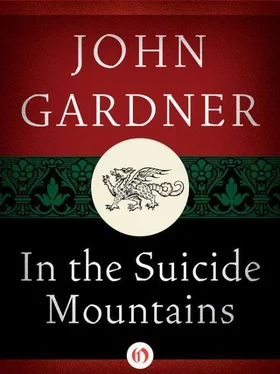Armida watched through spread fingers, more and more suspicious.
Chapter Ten. The Abbot’s Second Tale
A certain king in a certain land had twelve daughters, each more beautiful than the last. Every night these princesses went away, no one knew where; and every night each of them wore out a new pair of shoes. The king could not get shoes for them fast enough, and he wanted to know where they went every night and what they did. So he prepared a feast, summoned kings and princes, noblemen, merchants, and the humblest tradesmen, and, when they were assembled, said: ‘Can anyone solve this riddle of my daughters’ shoes? He who solves it will receive his favorite princess in marriage and half the kingdom as her dowry.’ However, no one had the nerve to undertake to find out where the princesses went, except one needy nobleman, who said: ‘Your Majesty, I will find out.’ ‘Very well, find out.’
“Soon the needy nobleman began to doubt and thought, ‘What have I done? I have undertaken to solve this riddle, yet I do not know how. If I fail, the king will put me in prison.’ Thus he walked along with a sad face. He met an old woman who asked him: ‘Why are you so sad, my good man? Christ has died for us, and God is in his heaven.’ He answered, ‘Little mother, that’s all very well, but how can I help but be sad as I walk? I have undertaken to find out for the king where his daughters go each night, and if I fail he will put me in prison.’ ‘Yes, that is a gloomy prospect,’ said she, ‘but not much more gloomy than continued poverty, and not much more gloomy than marriage to an obdurate princess. Make your peace with God, for earth is at bottom a silly place.’ ‘That is good advice; I will follow it.’
“The man went home in his threadbare cloak to his threadbare castle and called a priest and made his peace with God, and after that he felt more cheerful. The next day he met the old woman again, and she addressed him saying: ‘I see you have made your peace with God.’ ‘Little mother,’ he answered, ‘so I have, and as the world rolls on, he has granted me his humor. I have a suspicion that the king will not be pleased to learn where his daughters have been going and wearing out their shoes, once he finds out; and though I may be miserable, so is the king, and surely an ordinary nobleman should smile and be cheerful when he has the luck of a king. It is true, however, that I’m no closer to solving the riddle than I was before.’ ‘Yes, that is a difficult task,’ said the old woman. ‘But it can be accomplished. Here is Saint Krasna’s invisibility cap; with its help you can find out many things. Now listen well: when you go to bed, the princesses will give you a sleeping potion. Turn your face to the wall and pour the drops into your bed, and do not drink them.’ The nobleman thanked the old woman and returned to the palace.
“At nightfall he was assigned a room next to the bedroom of the twelve princesses. He lay on his bed and made ready to watch. Then one of the princesses brought him sleeping drops in wine and asked him to drink her health. He could not refuse, took the cup, pretended to drink, then turned to the wall and emptied the cup into his bed. On the stroke of midnight the princesses came to see whether he was asleep. The nobleman pretended to be sleeping so soundly that nothing could rouse him, but actually he was listening to every rustle. ‘Well, little sisters,’ said one of them, ‘our guard has fallen asleep; it is time for us to go to the ball.’ ‘It is time,’ said the others, ‘high time!’
‘They dressed in their best garments; the oldest sister pushed her bed to one side and disclosed a passage to the underground kingdom, realm of the accursèd king. They began to climb down the stairs. The nobleman quietly rose from his bed, donned his invisibility cap, and followed them. Accidentally he stepped on the youngest princess’s dress. She was frightened and said to her sisters: ‘Ah, little sisters, someone seems to have stepped on my dress; this is a bad omen.’ But her sisters scoffed. ‘Don’t worry,’ they said, ‘nothing will happen to us.’ They went down the stairs and came to a grove where golden flowers grew. The nobleman picked one flower and broke off a twig, and the whole grove rumbled. ‘Ah, little sisters,’ said the youngest princess, ‘do you hear how the grove is rumbling? This bodes no good!’ But again her sisters scoffed. ‘Fear not,’ they said, ‘it is the music in the accursèd king’s palace.’
“They came to a palace with a hundred rooms, each more evil than the last, and were met by the king and his demonic courtiers. Infernal music began to play and they began to dance; they danced till their shoes were torn to shreds. The king ordered wine to be served to the guests. The nobleman took a goblet from the tray, drank the wine, and put the goblet in his pocket. At last the party was over; the princesses said farewell to their demon cavaliers, promised to come again the next night, returned home, undressed, and went to sleep.
“The next morning the king summoned the needy nobleman. ‘Well,’ he said, ‘have you discovered what my daughters do every night?’ ‘I have.’ ‘Then where do they go?’ ‘To the underground kingdom, to the accursèd king, and there they dance all night.’ The king went pale with rage and fear and summoned his daughters and began to question them: ‘Where were you last night?’ The princesses denied everything. ‘We did not go anywhere,’ they said. ‘It must be that mice have destroyed our shoes.’ The king said: ‘Have you not been with the accursèd king? This nobleman testifies against you and is ready to offer proof.’ ‘Father, he cannot offer proof, for he slept all night long like the dead.’ The needy nobleman drew the golden flower and the goblet from his pocket. ‘Here is the proof.’ The princesses had no choice but to confess everything to their father. He ordered the passage to the underground kingdom to be bricked up, and married his youngest daughter to the needy nobleman. From the beginning, the nobleman expected nothing of his wife, but as the years passed she gradually became all that his heart could have asked for.”
No one spoke for a time when the abbot’s tale ended. At last the abbot said, his voice slightly quaking, his gentle lips atremble, “There are three basic theories about the world, Prince. One is that it is essentially good, one is that it’s essentially evil, and one is that it’s neutral. What a wise man understands is that none of that is true. The world is a hodge-podge. Our human business, therefore — since our chief attribute is consciousness, and our greatest gift from God is, as Dante said, free will — our human business is to clarify, that is, sort things out, put the good with the good and the evil with the evil and the indifferent with the indifferent. Only when reality is properly sorted out can there be stability or hope for the future in either the individual or the state.”
“Hmm,” said the prince.
“That,” said the abbot, “is the reason you have really no choice, as a prince and a feeling creature, but to kill the dragon Koog.”
“I’m not sure I follow the logic,” the prince said.
“What could be simpler, my dear prince? A dragon is a confusion at the heart of things, a law unto himself. He embraces good, evil, and indifference; in his own nature he makes them indivisible and absolute. He knows who he is . Surely you see that!”
For a moment the prince did not answer; no sound whatever came from him through the darkness. Then: “Perhaps I’m a little tired,” he said.
“Put it this way,” said the abbot. “Dragons all love life’s finer things — music, art, treasure — the works of the spirit; yet in their personal habits they’re foul and bestial — they burn down cathedrals, for instance, and eat maidens — and they see in their whimsical activities no faintest contradiction!” The words made the abbot gasp, as if the deep immorality of dragons was somehow personally threatening. Almost with a snarl the old man continued: “Dragons never grow, never change. Did you ever hear of a dragon committing suicide? Of course not! Believe me, nothing in this world is more despicable than a dragon. They’re a walking — or flying — condemnation of all we stand for, all we pray for for our children, nay, for ourselves. We struggle to improve ourselves, we tortuously balance on the delicate line between our duties to society and our duties within — our duties to God and our own nature.”
Читать дальше












